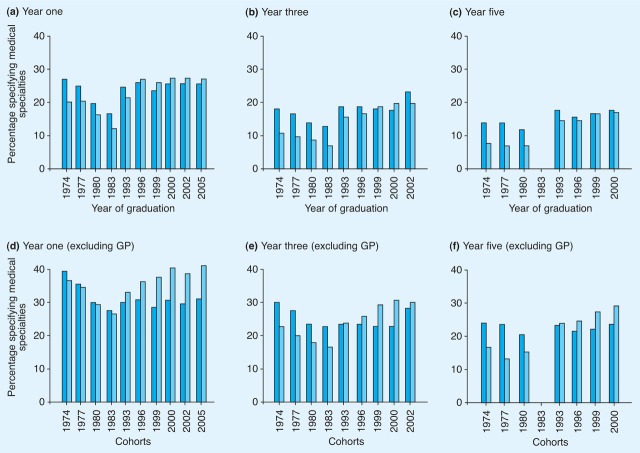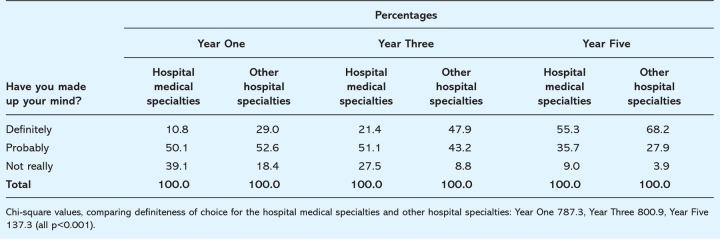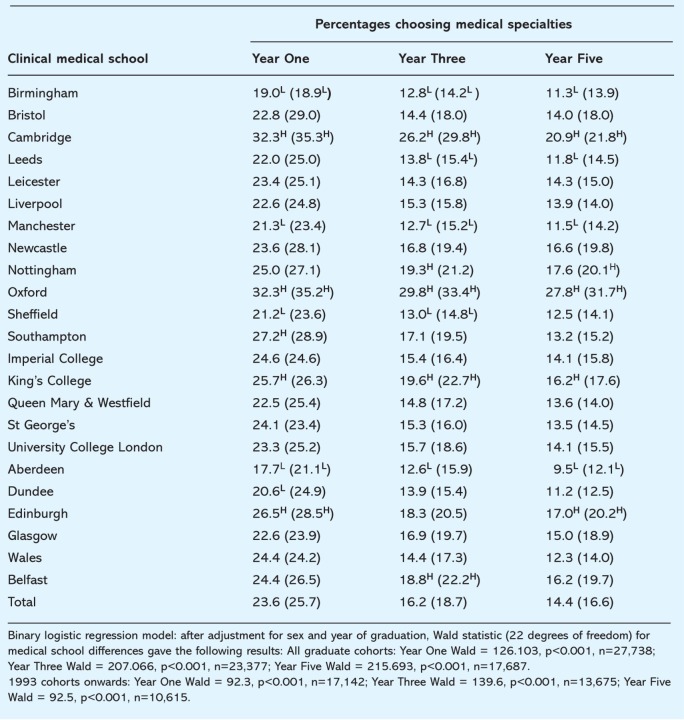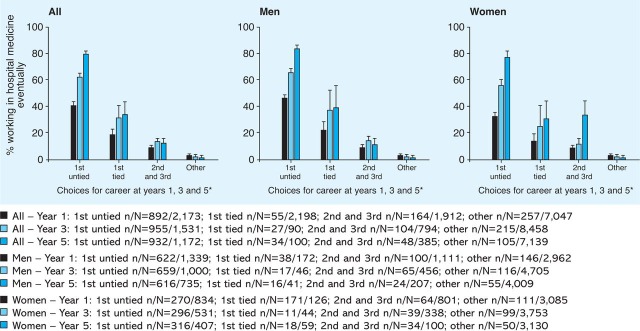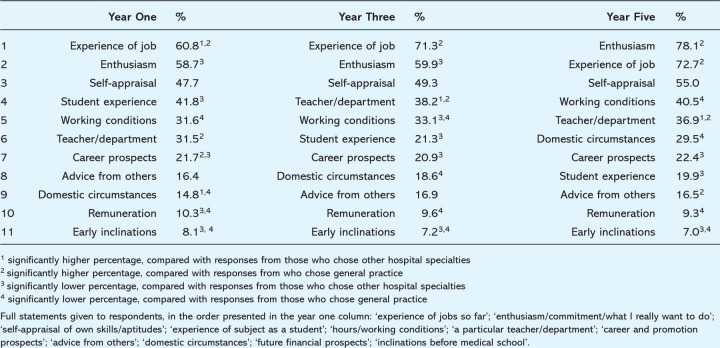Abstract
This article summarises findings from studies of career choices made for the hospital medical specialties by medical graduates one, three and five years after qualifying from UK medical schools in selected years from 1974 to 2005. The percentage of doctors who, early in their careers, expressed a preference for the hospital medical specialties declined between the 1970s and 1980s, increased during the 1990s, and has stabilised since then. The percentage of women medical graduates who want a career in the hospital medical specialties is now similar to that of men. Compared with doctors who choose other specialties, a higher percentage of doctors who choose the hospital medical specialties are uncertain about their specialty choice in the early years after qualification. This uncertainty needs to be considered by those planning postgraduate medical education for the hospital medical specialties, particularly now that postgraduate training in the UK has become much more structured.
Key Words: careers, career choices, cohort study, hospital medicine, medical schools, medical workforce
Introduction
The UK Medical Careers Research Group has undertaken surveys of medical qualifiers from all medical schools in the UK in selected years since 1974 and aims to document the career choices, career progression, career destinations and views of doctors. As they have emerged, findings from each survey on the career choices of doctors in their early years after qualification have been published and the results have been communicated to policy makers in medical education and workforce planning.1–3 Information is now being collated about individual specialties, drawing together findings from 30 years of surveys.4–6 In this paper findings about early career choices for the hospital medical specialties are collated and expanded, using data from surveys conducted between 1974 and 2002. New findings have also been included from surveys undertaken since 2002.
Methods
Surveys have been undertaken by the UK Medical Careers Research Group of the UK medical graduates of 1974, 1977, 1980, 1983, 1993, 1996, 1999, 2000, 2002 and 2005. The methods have been described in detail elsewhere.1–3 In brief, towards the end of the first and third years after graduation, and at longer time intervals after that, postal questionnaires are sent to all medical graduates from each UK medical school. In 1974 the graduates of all medical schools in England, Wales and Scotland were surveyed. From the cohort of 1977 onwards, the surveys covered the whole of the UK including Northern Ireland.
The doctors who were contacted in the first survey of each cohort comprised the whole cohort as it was at the time of qualification. Subsequent surveys of each cohort excluded only those doctors who previously had indicated that they did not wish to participate, who were untraceable, or who were known to have died. For the initial survey, addresses were obtained from the doctors' registration with the General Medical Council. For follow-up surveys, the addresses supplied by the doctors at each previous survey and/or those identified from the most recent medical registers and directories were used.
Each doctor was asked, ‘Have you made up your mind about your choice of long-term career?’ and was invited to choose a response from ‘definitely’, ‘probably’ or ‘not really’. Each was asked to specify their choice in their own words and to be as general or specific as they wished. If they had more than one choice, they were told to list up to three in order of preference and, if applicable, to indicate that choices were of equal preference. Additionally, those who graduated between 1993 and 2005 were invited to signify which factors, from a list of 11 possible ones specified in the questionnaire, had influenced their choice of career ‘a great deal’, ‘a little’ or ‘not at all’. For this paper, choices for the hospital medical specialties were selected. Under this heading were included choices and career destinations described by the respondents as general medicine or as one or more of the specialties (such as cardiology, gastroenterology, neurology or rheumatology) recognised by the Department of Health as included under ‘general medicine’ (Box 1). It is common for those who want to be hospital specialist physicians to state ‘general medicine’ in the first postgraduate year and to give individual specialties or subspecialties within medicine in later years. They were compared, as a group, with choices for all other branches of clinical practice combined. The data were analysed by univariate cross-tabulation. The significance of comparisons between groups of doctors were calculated by the use of logistic regression, χ2 tests and adjusted residuals.
Results
Response rate
The questionnaires were sent to a total of 38,280 UK doctors covering all 10 cohorts in the pre-registration year. A total of 27,749 doctors (72.5%) replied. Three years after qualification, the questionnaire was sent to 33,151 doctors covering the first nine cohorts (1974–2002). Of these, 23,468 (70.8%) replied. Five years after qualification 17,689 out of 24,870 (71.1%) replied to the third survey (the 1983 cohort was not re-surveyed at that time).
Box 1. Department of Health's definition of general medicine specialties.
Hospital medical specialties as first choice of long-term career
The percentage of doctors who specified hospital medical specialties as their first choice of long-term career, at the end of the pre-registration year, declined between the cohorts of 1974 and 1983, increased substantially between 1983 and 1996, and remained reasonably steady thereafter (Fig 1a). A similar pattern of decline between 1974 and 1983 and a rise thereafter was found for first choices for the medical specialties expressed at years three and five after qualification (Figs 1b–1c).
Fig. 1.
UK doctors in each year of graduation who specified medical specialties as their first choice of eventual career: percentages of all respondents (a–c), and of all respondents excluding those who chose general practice (GP) (d–f).
Chi-square test comparing choice for the hospital specialties made by men and women (all graduation years combined): Year One χ21 = 0.2, p=0.63; Year Two χ21 = 15.0, p<0.001; Year Three χ21 = 10.4, p<0.001. ▧Men □Women
Up to and including the cohort of 1993, a higher percentage of men than women chose the hospital medical specialties in years one, three and five. A higher percentage of women than men chose medical specialties in year one in the cohorts from 1999, though this difference was not sustained in years three and five.
The percentage of doctors, both men and women, who expressed a first choice for the medical specialties dropped markedly between years one and three after qualification (Figs 1a–1c). The drop between year one and year three was larger in the early cohorts than in those since 1993, particularly for women. For example, in the cohorts of 1974–1983 the percentage of men who chose the medical specialties dropped from 22% in year one to 15% in year three, and for women from 17% in year one to 9% in year three. In the cohorts of 1993–2002, the percentage of men who chose the medical specialties dropped from 25% in year one to 19% in year three, and for women from 26% in year one to 18% in year three.
First, second and third choices of career
In all, 39.2% of men and 40.5% of women expressed a choice for the medical specialties as their first, second or third choice in year one, as did 24.5% of men and 22.9% of women in year three, and 19.4% and 17.8% in year five (data not shown). There has been no appreciable change in these percentages since the 1980s.
Percentages of doctors who chose hospital medical specialties, excluding the doctors who chose general practice
It is possible that, for some doctors, their first main decision is whether or not to seek a career in general practice. Choices for the hospital medical specialties were therefore recalculated omitting from the denominator those doctors whose first choice was general practice (Figs 1d–1f). This shows that, independently of choices for general practice, there was a decline in the percentage of doctors who expressed a first choice for the medical specialties between the cohorts of 1974 and 1983; a rise between 1983 and 1993; and, after 1993, a levelling off in the percentage of men and a continued rise in the percentage of women choosing the specialties. Figures 1d–1f also show that, of those choosing hospital practice in recent years, a much higher percentage of women than men now express a preference for the medical specialties. By contrast, a much higher percentage of men than women choose surgery.
Certainty of choice
Doctors who specified that the medical specialties were their first choice of career were much less definite about their choice than doctors who chose other careers. Of those who chose the medical specialties at the end of year one, only 11% of doctors (13% of men and 8% of women) said that they were definite about their choice (Table 1). By contrast, 29% of doctors who chose other careers in clinical practice, and 38% of those whose first choice was general practice, were definite about their choice of specialty at the end of the first postgraduate year. By the end of year three, only 21% of doctors (25% of men and 17% of women) who chose the medical specialties were definite, compared with 48% of all respondents (50% of men and 45% of women) who chose other careers in hospital practice. Doctors who chose careers in general practice were much more certain about their choice, from soon after qualifying, than doctors who expressed a preference for hospital medical specialties. Recent cohorts were hardly more certain about their choice than earlier cohorts: of those who chose the medical specialties in year one, 12% of the qualifiers of 1974–1983 and 11% of those of 1993–2005 said that they were definite about their choice. Of those who chose the medical specialties in year three, 18% of the cohorts of 1974–1983 said that they were certain about their choices as did 23% of the cohorts of 1993–2002.
Table 1.
Percentage of doctors who said that their choice of future career was definite or probable, comparing those who chose hospital medical specialties with those who chose other hospital specialties, at year one, three and five after qualification.
Choice by medical school
A higher percentage of graduates from Oxford and Cambridge than from other medical schools chose hospital medical specialties as their preferred career (Table 2). Other medical schools whose graduates were significantly more likely than average to name a medical specialty as first career preference were Edinburgh in years one and five, King's College and Belfast in year three, and Nottingham in year five. Medical schools with a significantly lower percentage of choice than the national average were Birmingham and Aberdeen at the end of year one, Birmingham, Leeds, Manchester and Sheffield at year three, and Aberdeen at year five.
Table 2.
Percentages of graduates from each medical school who specified hospital medical specialties as their first choice of career one, three and five years after graduation, with percentages in recent years (from 1993 inclusive) in parentheses. Graduates from the University of London have been aggregated according to current medical schools. Leicester, in recent years, includes Leicester/Warwick. Where the level of choices differed significantly (p<0.05) from the overall average it is marked as low (L) or high (H).
Early choices and eventual destinations
In this analysis, as in all our analyses, the medical specialties were considered as a group (see Box 1). For example, a doctor who specified cardiology in year one and was working in general medicine in year 10, or vice versa, was considered to be working in the same broad specialty as their earlier choice.
Of those who expressed an untied first choice for the medical specialties in years one, three and five respectively, 41.0%, 62.4% and 81.6% eventually practised in the specialty group (Fig 2). Of those, whose first choice for the medical specialties was tied with a choice from another specialty group, the corresponding percentages for the three years of choice were 19%, 31% and 34%. The percentages of those who gave the medical specialties as their second or third choice, or who did not choose the medical specialties at all, who eventually worked in them were much lower (Fig 2).
Fig. 2.
Relationship between early career choice and eventual career destination: percentage who originally made each choice, at years one, three or five and who eventually worked in the hospital medical specialties. Data on career destinations comprise the 1974, 1977, 1983 and 1993 years of graduation cohorts at year 10, and the 1996 cohort at year 7. ∗Choices are – 1st choice for the medical specialties, untied; 1st choice for the medical specialties, tied with another specialty choice; 2nd or 3rd choice, but not 1st choice, for the medical specialties; ‘other’ denotes choices made for all specialties other than those in hospital medicine.
The relationship between early choices and eventual destinations was much weaker for choices for hospital medicine than for other hospital specialties. Combining data on choices for the hospital specialties other than medicine, in years one, three and five, respectively 53.8% (2,363/4,394), 73.4% (2,739/3,733) and 85.5% (3,035/3,549) eventually practised in their chosen specialty group. The differences between the medical specialties and other hospital specialties was statistically significant: χ21 = 93.7, for year one, 62.2, for year three, and 9.8 for year five, all p <0.01.
Women showed a lower level of correspondence between choice and destination than did men (Fig 2). For example, among those with untied first choices for the medical specialties, the gap closed from year one (men 46.5%, women 32.4%) to year three (65.9%, 55.7%) to year five (83.8%, 77.6%). The percentages of those who gave other specialties as their first choice, but who eventually worked in the hospital medical specialties, were small (Fig 2) but, in terms of numbers, the group was sizeable (421 doctors in year one, 319 in year three and 153 in year five).
Factors that influenced career choice for the medical specialties
One year after graduation, the three factors rated by the doctors choosing medical specialties as having most influence on their choice were ‘experience of jobs so far’ (rated highly by 61%), ‘enthusiasm/commitment: what I really want to do’ (59%), and ‘self-appraisal of own skills/aptitudes’ (48%). In years three and five these three grew in importance and remained the highest rated factors (Table 3).
Table 3.
Doctors who specified the hospital medical specialties as their first choice of career at one year, three years and five years after graduation: percentage who indicated each factor as having influenced their choice of long-term career ‘a great deal’.
‘Inclinations before medical school’, ‘future financial prospects’ and ‘advice from others’ were relatively unimportant influences. ‘Domestic circumstances’ and ‘hours/working conditions’ showed increasing influence over the years, and ‘experience of subject as a student’ declined.
The results were compared for those who chose the medical specialties with those who chose general practice or other areas of specialist practice (see notation on Table 3, detailed results not shown and available from authors). Doctors who chose general practice gave a significantly lower rating to ‘experience of jobs so far’. Doctors who chose other areas of specialist practice gave a lower rating to ‘experience of jobs so far’ but a higher rating to ‘enthusiasm and commitment’.
The doctors' expectations about ‘working hours and conditions’, and their own ‘domestic circumstances’, were less influential factors for choosing the medical specialties than for general practice, but similar to other hospital specialties. ‘Inclinations before entering medical school’ were a less important influence in the hospital medical specialties than others. The ‘influence of a particular teacher or department’, and ‘experience of jobs so far’, became more important influences by year three, and were significantly more influential in choices for the medical specialties than for other specialties. ‘Future financial prospects’ and ‘advice from others’ were not particularly important influences.
Discussion
An important strength of the surveys is that they are longitudinal and prospective. They avoid any possibility of recall bias or lack of recollection. The surveys are also longstanding, with information about successive cohorts over a 30 year period, and they cover the whole of the UK.
The percentage of newly qualified women doctors who want a long-term career in the hospital medical specialties is now similar to that of men. Many more women than men now enter medical school; and therefore the number of women doctors, who want a career as hospital physicians now exceeds that of men. Because of the pattern of part-time working of many women doctors, the changing gender balance in the hospital medical specialties is a major factor in hospital workforce planning and will become more so.
There are some striking contrasts between doctors who express early choices for a career as a hospital physician and those who express other career choices in medical practice. A much higher percentage of those who choose the medical specialties than of others say that, early in their careers, they are uncertain about their choice. There is a relatively large drop, between year one and three after qualification, in the percentage who say that they want a career in the medical specialties. The predictive power of early choices for the medical specialties, in translating into eventual career destinations, is much lower than that for other choices of specialty. However, the majority of those choosing medical specialties cited enthusiasm for the specialty as a factor influencing their choice, although, in the early years, those choosing other hospital specialties regarded enthusiasm for their choice as slightly more influential. A large percentage of doctors who did not put the medical specialties as their first choice do specify them as a second or third choice, but only a small percentage of those who give the medical specialties as their second (or third) choice eventually practise in them. The most likely interpretation of these findings, taken together, is that, in the early years after qualification, a substantial percentage of doctors have an interest in pursuing the hospital medical specialties because they are so familiar with them from medical school and house jobs. It is also likely that some doctors expressed a choice for the hospital medical specialties in their early years because they did not feel knowledgeable about careers in other specialties, particularly in those that gave little exposure at medical school. It is also very likely that some of the drop from years one to three and five, in the percentage of doctors wanting careers as hospital physicians, reflects the effect of tough competition for posts, and perhaps difficulty with higher examinations.
Training in the UK has changed substantially in recent years, with the implementation of the Calman Reforms and Modernising Medical Careers (MMC), towards much greater structure in postgraduate training.7,8 It will be less easy than in the past for doctors to change career plans after the first two or three years of postgraduate work, although the review of MMC may re-establish greater flexibility in the timing of definitive career choices.9 It is important that medical educators and workforce planners understand that there are much greater uncertainties among aspiring hospital physicians about their future choice of specialty, in the early years after qualification, than is the case for many other specialty groups.
Ethical approval
Ethical approval for the UK Medical Careers Research Group cohort studies has been obtained through the Central Office for Research Ethics Committees, following referral to the Brighton Mid Sussex and East Sussex local research ethics committee.
Funding
The UK Medical Careers Research Group is funded by the Department of Health. The Unit of Health-Care Epidemiology is funded by the NHS National Centre for Research Capacity Development.
Acknowledgements
We are very grateful to all the doctors who participated in the studies, and to James Parkhouse who devised the original surveys. We thank Emma Ayres, Janet Justice and Alison Stockford for data preparation and administration.
Reference
- 1.Lambert TW. Goldacre MJ. Edwards C. Parkhouse J. Career preferences of doctors who qualified in the United Kingdom in 1993 compared with those of doctors qualifying in 1974, 1977, 1980, and 1983. BMJ. 1996;313:19–24. doi: 10.1136/bmj.313.7048.19. [DOI] [PMC free article] [PubMed] [Google Scholar]
- 2.Goldacre MJ. Davidson JM. Lambert TW. Career choices at the end of the pre-registration year of doctors who qualified in the United Kingdom in 1996. Med Educ. 1999;33:882–9. doi: 10.1046/j.1365-2923.1999.00560.x. [DOI] [PubMed] [Google Scholar]
- 3.Lambert TW. Goldacre MJ. Turner G. Career choices of United Kingdom medical graduates of 1999 and 2000: questionnaire surveys. BMJ. 2003;326:194–5. doi: 10.1136/bmj.326.7382.194. [DOI] [PMC free article] [PubMed] [Google Scholar]
- 4.Goldacre MJ. Turner G. Fazel S. Lambert TW. Career choices for psychiatry: national surveys of graduates of 1974–2000 from UK medical schools. Br J Psychiatry. 2005;186:158–64. doi: 10.1192/bjp.186.2.158. [DOI] [PubMed] [Google Scholar]
- 5.Turner G. Lambert TW. Goldacre MJ. Barlow D. Career choices for obstetrics and gynaecology: national surveys of graduates of 1974–2002 from UK medical schools. Br J Obstet Gynaecol. 2006;113:350–6. doi: 10.1111/j.1471-0528.2006.00848.x. [DOI] [PubMed] [Google Scholar]
- 6.Lambert TW. Goldacre MJ. Domizio P. du Boulay C. Career choices for pathology: national surveys of graduates of 1974–2002 from UK medical schools. J Pathol. 2006;208:446–52. doi: 10.1002/path.1886. [DOI] [PubMed] [Google Scholar]
- 7.Working Group on Specialist Medical Training. Hospital doctors: training for the future. London: Department of Health; 1993. [Google Scholar]
- 8.Department of Health. Unfinished business: proposals for reform of the senior house officer grade. London: DH; 2003. Modernising Medical Careers – the response of the four UK health ministers to the consultation on. [Google Scholar]
- 9.Tooke J. Aspiring to excellence: findings and recommendations of the independent inquiry into Modernising Medical Careers. London: MMC Inquiry; 2007. [Google Scholar]




